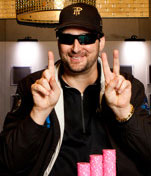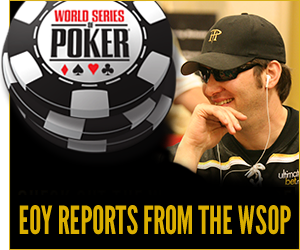-
Win Your Way In!
In the UltimateBet.net Poker Challenge III Finals, shown Final Four weekend on FSN (Fox Sports Net), six players had a crack at the $200,000 first-place prize, but second place was a whole lot of nothing. Thirty-one players had won their way into the televised tournament through a free promotion at UltimateBet.net, and none of them was used to playing poker for more than a few dollars. But now they were playing for $200,000 for first, and nothing for second, so the pressure was on!
The following five men won their FSN televised six-handed tournaments — and $10,000 each for first place — to qualify for the finale; Josh Taub, Adam Marshall, Tom McCormick III, Mo Poons, and New York State Trooper Mark Cianfrini (sin-free-nee). This had reduced the 30 men down to five, and then a wild card online qualifier, Scott Friend, was added to the mix. (By the way, I was announcing this finale for FSN along with regular announcers Barry Tompkins and John Vorhaus.)
Although I didn’t know anything about any of our six finalists, I announced that I was rooting for Cianfrini because I always pull for policemen and firemen, especially since Sept. 11. Vorhaus, author of the “Killer Bee” poker books, went on record saying he thought Poons would win it all. When graduate student Poons went all-in in a big pot with pocket queens against Marshall’s A-8 (the queens were a 2-1/2-to-1 favorite), he looked like a great pick, until an ace fell on the last card to eliminate Poons in sixth place.
Cianfrini kind of sat there, not engaging in many hands, playing patiently while waiting for some strong hole cards. Friend’s inexperience (he made a big and unnecessary bluff) cost him any chance he had of winning, and he was eliminated in fifth place. Meanwhile, Marshall was playing a good, aggressive game. He was raising a lot of pots, and winning most of them uncontested — in effect using his big chip stack like a weapon to pick up a bunch of blinds and antes, which in turn built him an ever-growing chip lead. After McCormick fell out in fourth place, it looked as if Marshall might pull out the win, as long as he didn’t get too aggressive. With three players left, the pressure was mounting!
Cianfrini, whom I had almost given up on for lack of bluffing ability, started to make a few well-timed bluffs. McCormick then made a blunder that cost him the tournament. From the small blind, with the blinds at $800-$1,600 and a $200 a man ante, McCormick moved all-in with Jh-6h on Cianfrini, who was in the big blind. Cianfrini immediately called with pocket eights, and the eights — which were a 2-1/2-to-1 favorite over the Jh-6h — held up, and McCormick was out, in third place. I told McCormick on air later that I thought that a raise would have been a good move, since Cianfrini was folding a ton of hands, so why risk $16,000 when a $4,500 bet would have accomplished the same thing? That way, if Cianfrini did move all-in, McCormick would have lost merely $4,500 instead of everything.
It was now down to Taub and Cianfrini. With the blinds at $2,500-$5,000 and a $500 a man ante, Taub moved all-in for $12,000 from the small blind (which is on the button when you play heads up) with 10d-3d, and Cianfrini called with Q-J. I cannot criticize Taub’s move, seeing that the blinds were relatively steep compared to his extremely short stack. And when the flop came 6s-10c-10s, Taub won the pot.
Two hands later, Taub pushed with 7-5, and Cianfrini called with K-4. The flop came down 4-6-6, then an eight for Taub to hit his straight and win this pot too. Taub had made a move, got caught with his hand in the cookie jar, and somehow won the pot anyway (though the 7-5 was only a three-to-two underdog to the K-4).
The very next hand Cianfrini moved all-in with Qs-7s, and Taub called him with Ad-Jd. When the chips were finally counted down, it was determined that both players had $29,500 in this pot. Taub now had only $1,000 left, which meant that $59,000 of the $60,000 in the tournament was in the middle of the pot. (By the way, it was Taub’s first chance to win the tournament.) I announced that it wouldn’t surprise me if Cianfrini won the hand, even though he was about a seven-to-four underdog, because he had just won two pots in a row, both times holding the worst hand, to stave off elimination. So much for that theory!
The flop came down As-8d-4d, which was a huge flop for Taub. He had flopped not only an ace, but also a flush draw. The fat lady was starting to sing, but first we looked at the turn card, which was the 10s. Now Cianfrini could win with any spade on the last card, but there were only nine spades left, compared with 35 non-spades. In other words, the 10s gave Cianfrini some hope, but he was still about a four-to-one underdog. The last card was the 5s, a demoralizing turn of events for Taub (who had the tournament and the accompanying $200,000 firmly in his grip after the flop), and Cianfrini went on to win the championship!
On air, I told him, “It will be hard for you to give anyone a speeding ticket now. They’ll recognize you.”
A big bluff can:
A) cost you the whole tournament
B) win you a bunch of chips
C) straddle the line between good play and bad play
D) all of the aboveAnswer: A
Related Posts
- The Holiday Game
- Poker for Police Officers
- No ‘Blow-Up’ for Matusow
- Furst Versus Worst
- Cunningham Going for the Gold
- Winning from the Hole
- After-Hours Poker
- Key Hand at European Poker Championships
- Make the Most of It!
- One Tough Poker Game
Recent Posts
- WSOPE 2nd place finish
- Update from this years WSOP 2019
- Happy Holidays! Updated stock at Poker Brat, new book!
- Phil Hellmuth wins historic 15th World Championship!
- Final golden ticket winner coming soon
- Poker Brat – The Phil Hellmuth Jr. Autobiography
- Phil Hellmuth’s “Pokerbrat” – Coming soon to audio book!
- Poker Night in America – Sugar House Casino
- Sugar House w Matt Glantz
- Lost and found

 ™
™








